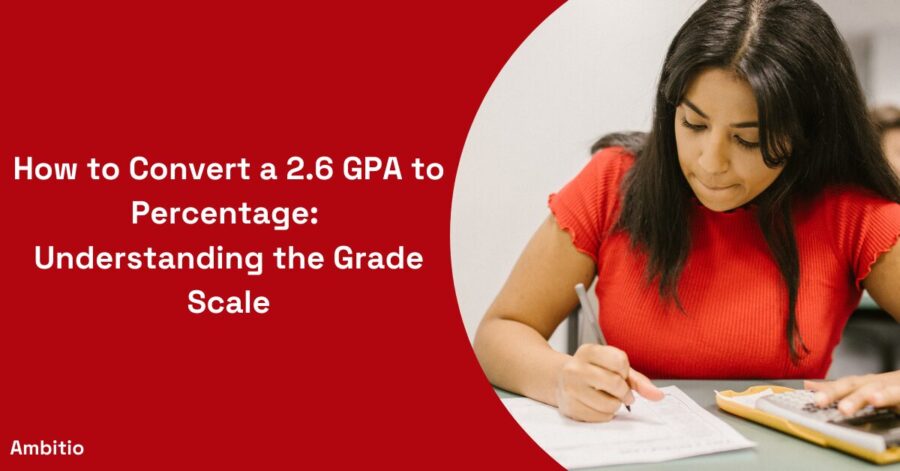13 December 2024
4 minutes read
How to Convert a 2.6 GPA to Percentage: Understanding the Grade Scale

Understanding GPA and Its Conversion to Percentage
If you’ve ever wondered how your 2.6 GPA translates into a percentage, you’re not alone. GPA (Grade Point Average) is a common way to measure academic performance in schools and colleges.
In this guide, we’ll delve into the world of GPAs, letter grades, and the conversion from GPA to percentage. Whether you’re a high school student aiming for college or a college student aiming to improve your grades, this information will be invaluable.
What is GPA, and How is It Calculated?
GPA stands for Grade Point Average and is a numerical representation of your academic performance. It is typically measured on a scale of 0 to 4.0 in the United States, with 4.0 being the highest achievable GPA. Here’s a breakdown of the GPA scale:
The GPA Scale Explained
The GPA scale is a critical component of academic evaluation. Understanding how it works is the first step toward converting your GPA to a percentage. Let’s break down the scale further:
A = 4.0
An “A” grade corresponds to a 4.0 GPA. This is the highest grade you can achieve in most grading systems. It indicates excellent performance in a course.
B = 3.0
A “B” grade corresponds to a 3.0 GPA. This is a good grade and represents above-average performance in a course.
C = 2.0
A “C” grade corresponds to a 2.0 GPA. This is considered satisfactory, but it indicates average performance in a course.
D = 1.0
A “D” grade corresponds to a 1.0 GPA. This is a passing grade but represents below-average performance in a course.
F = 0.0
An “F” grade corresponds to a 0.0 GPA. This is a failing grade and indicates that you did not meet the course requirements.
Now that you understand the GPA scale, let’s move on to the conversion process.
Converting 2.6 GPA to Percentage
Converting your GPA to a percentage isn’t a straightforward process because different schools and colleges may use slightly varying grading scales. However, there’s a general method you can follow:
Understanding Your School’s Grading Scale
Before you can convert your GPA to a percentage, you need to understand your school’s grading scale. Some institutions may use a 4.0 scale, while others might have a 5.0 or 10.0 scale.
Using a GPA to Percentage Calculator
Online GPA to percentage calculators can be a handy tool. They often allow you to select your school’s specific grading scale for accuracy.
Manual Calculation
If you prefer to do it manually, you can use a basic formula. For a 4.0 scale, multiply your GPA by 25. So, for a 2.6 GPA, the calculation would be: 2.6 x 25 = 65%. If your school uses a different scale, adjust the multiplication factor accordingly.
Remember, this is a general guideline, and for precise conversions, consult your school’s official conversion table or contact your academic advisor.
Why Does GPA Matter?
Your GPA is a crucial factor when applying to colleges and universities. While a 2.6 GPA may not be considered high, it doesn’t necessarily mean the end of your college dreams. Many institutions have varying admission criteria, and some may admit students with GPAs in this range.
- Admission Criteria
- Most colleges and universities consider GPA as one of the primary admission criteria.
- While a 2.6 GPA may be below the national average, it’s essential to research individual institutions’ requirements.
- Some schools have more lenient admission standards, while others are highly competitive.
- Holistic Evaluation
- It’s important to note that college admissions are not solely based on GPA.
- Many institutions take a holistic approach, considering factors such as standardized test scores, extracurricular activities, essays, recommendation letters, and interviews.
- Demonstrating Improvement
- If you have a 2.6 GPA but can show a consistent upward trend in your grades or have other strengths in your application, you may still have a chance to gain admission to your desired college.
- If you have a 2.6 GPA but can show a consistent upward trend in your grades or have other strengths in your application, you may still have a chance to gain admission to your desired college.
Strategies to Improve Your GPA
If you’re concerned about your 2.6 GPA and aiming for academic improvement, there are several strategies you can implement.
Study Habits and Time Management
Improving your study habits and time management skills can have a significant impact on your grades. Create a study schedule, stay organized, and seek help when needed.
Seek Academic Support
Don’t hesitate to reach out to your teachers or professors if you’re struggling with coursework. They can provide guidance and resources to help you succeed.
Consider Retaking Courses
If you’ve performed poorly in specific courses, consider retaking them to improve your grades. Some institutions allow grade replacement, which can boost your GPA.
Utilize Academic Resources
Colleges and universities offer various academic resources such as tutoring centers and writing labs. Take advantage of these resources to enhance your learning.
Conclusion
In conclusion, understanding your GPA and how it translates into a percentage is an important step in your academic journey. While a 2.6 GPA may not be exceptionally high, it’s essential to remember that academic success is not solely determined by this number. Hard work, dedication, and a commitment to improvement can help you achieve your educational goals, regardless of your starting GPA.
Remember that each educational institution may have its own policies and criteria, so research thoroughly and strive for excellence in your academic pursuits. Your GPA is just one part of your educational story, and with determination, you can continue to grow and succeed.
Frequently Asked Questions (FAQs)
What is considered a good GPA?
A GPA of 3.0 or higher is generally considered good. However, what’s considered “good” may vary depending on your academic goals and the competitiveness of the programs you’re applying to.
Can I improve my GPA if I have a 2.6?
Yes, you can improve your GPA by earning higher grades in your coursework. Speak to your teachers or academic advisors for strategies to raise your GPA.
Do all colleges use the same GPA scale?
No, colleges and universities may use different GPA scales. It’s essential to research the specific grading system used by the institutions you’re interested in.
How can I calculate my cumulative GPA?
To calculate your cumulative GPA, add up the grade points earned in all your courses and divide by the total number of credits or courses taken. This will give you your overall GPA.
Is GPA the only factor in college admissions?
No, college admissions consider multiple factors, including standardized test scores, extracurricular activities, essays, and recommendation letters. A strong overall application can compensate for a lower GPA.

You can study at top universities worldwide!
Get expert tips and tricks to get into top universities with a free expert session.
Book Your Free 30-Minute Session Now! Book a call now




























